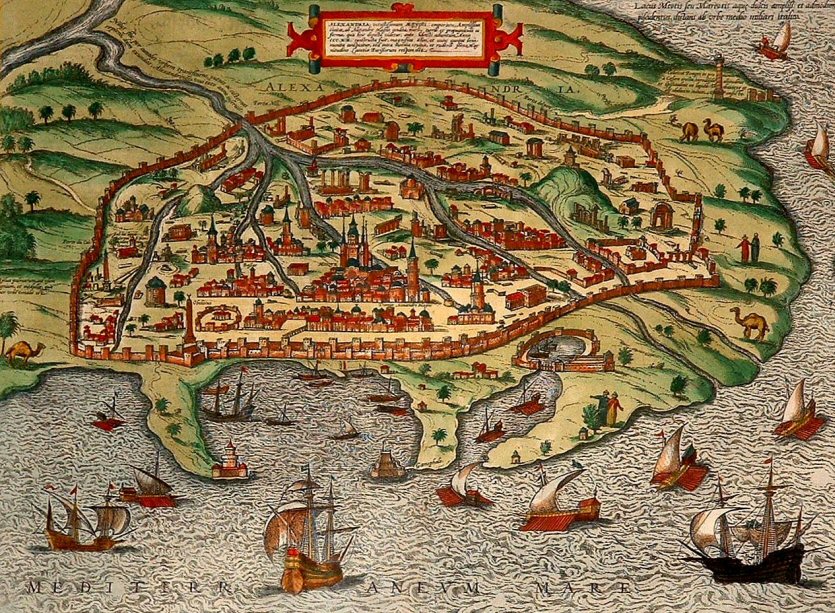I happen to be involved in a lot of archaeological work in this region which is called 'Chatby' today. It is a popular beach which lies on the southern shores of the Mediterranean. The building you see at the right is the Casino Chatby - not a gambling establishment but a popular cafe - which happens to be built on the ruins of one of the ancient buildings in the Martyrium complex. My friend and mentor Harry Tzalas, who happens to have been born in Alexandria, has located the site of the Martyrium (which is now buried underwater). We have located capitals and the synthronos from the original church. It is our hope to rent a large boat and move two thousand years of sand which covers the base of a massive Christian archaeological site that dates to the second century. The exact location of the Martyrium is indicated by the little boat in the foreground relative to the famous 'Library of Alexandria' (in the background) built in modern times:
Many of you might have heard about a recent storm that uncovered a buried statue in Israel. This same weather system had a much more devastating effect on Alexandria. It brings to mind a number of statements about how dangerous life must have been life for Jews, Samaritans and Christians living on the eastern shores of Alexandria which I thought I would reference along with the devastation of the photographs that were sent to me today.
Here is another picture of the main highway that runs across the shoreline of the Chatby suburb:
I am now going to post about twelve images from around the same area alongside descriptions of the fierce waves in Jewish, Samaritan and Christian literature to give the reader some sense of what life must have been like for the ancients living there. I hope you enjoy the slideshow!
"for after he [Flaccus] had set sail at the beginning of winter, for it was rightly ordained that he should have his fill of the dangers of the sea, inasmuch as he had filled all the elements of the universe with his impieties, after suffering innumerable hardships he with difficulty got safety to Italy" [Philo, Flaccus 125]
"They (the Jews) out of Syria, and inhabited near the tempestuous sea, and were in the neighborhood of the dashing of the waves." [Apion from Josephus Against Apion II.4]
"After that there came out Julian a resident of Alexandria [came] and a group of people joined him. He said, "Receive from me (the assurance) that the period of divine favor will appear (in due time). We have no authority to act uniformly by reciting (
St Mark "returned to Alexandria, and found that the brethren had been strengthened in the faith, and had multiplied by the grace of God, and had found means to build a church in a place called the Cattle-pasture (Τὰ Βουκόλου) near the sea, beside a rock from which stone is hewn" [Severus of al'Ashmunein History of the Coptic Patriarchs Book One Chapter 2]
"his house was declared to be the hospice for the stranger and the indigent. And above all this, he retained in a remarkable and singular measure his devotion to the faith, building up his own heart upon the rock that shall not be moved." [Acts of Archelaus 3]
the church of St. Mark "was only found to be like the rock on which the house was built with the most solid foundations; and when the rain descended, and the floods and the winds burst in and beat upon that house, it stood firm: for it had been built on the most solid and immoveable foundations." [Acts of Archelaus 46]
"But those who abstain from these things [the heresies] give their thoughts to divine things, and partake of gnostic food. "According to the grace," it is said, "given to me as a wise master builder, I have laid the foundation. And something else is buildeth on it gold and silver, precious stones." Such is the gnostic superstructure on the foundation of faith in Christ Jesus. But "the stubble, and the wood, and the hay," are the additions of heresies." [Clement of Alexandria Strom. 5.4]
Then the patriarch composed on this subject a homily, beginning thus : "The mercy of God which descends upon men." And he gave to the two children of the holy Mysteries. And he took them and their mother into his house until they had kept the Feast of the Holy Easter. Then they returned to their own city in peace.
But when her husband learnt what she had done, he went to Diocletian, the unbelieving prince, and said to him : "Know, my lord the prince, that my wife committed adultery in this city; and when I hindered her, she went away to Alexandria, and committed adultery with the Christians during many days; and she took my children, and performed upon them a rite called baptism. And behold, she has returned hither. What thinkest thou that I should do with her?" Then Diocletian commanded Socrates her husband to bring her and her two children before him; and he did so." [Severus of Al'Ashmunein Book Two Chapter 6]
"And the waves carried him [Athanasius], while God guarded and guided him, until he arrived at Alexandria unexpectedly on the third day. Thereupon the priests and people went out to him, and met him with joy and chanting, and so accompanied him until he entered the church, and expelled from it George, and those who believed in his corrupt faith. And Athanasius kept on that day a festival to the Lord; and the people rejoiced in all the provinces of Egypt. And after seven years a man came whose name was Gregory, with whom were two thousand men who were soldiers ; and he pillaged the church, and remained in possession of the see four years." [ibid Chapter 8]












